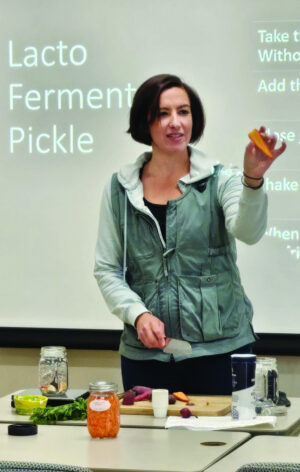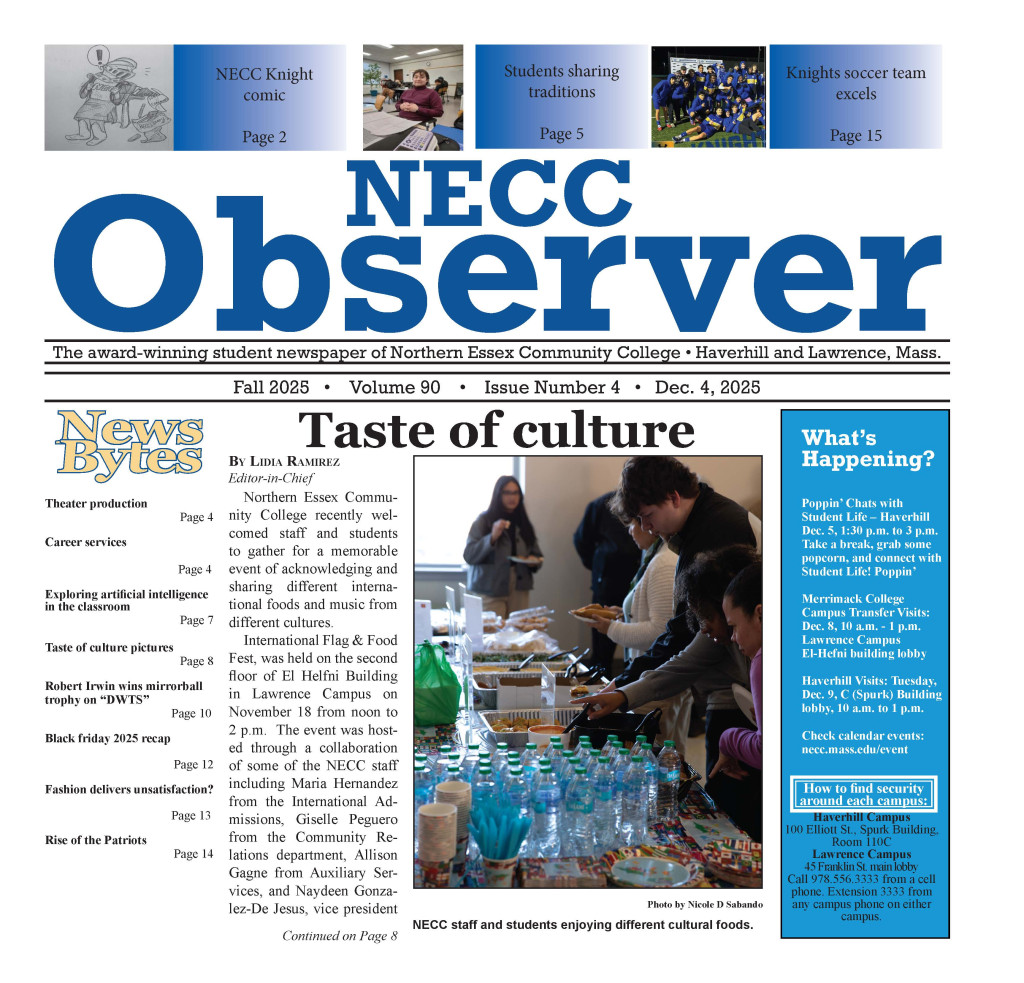
A speaker recently vistied NECC to share how she left her office job and dove into the fermenting world for good.
Probably you have tried pickles or had a salad with a vinegar-based dressing like Italian dressing. If so, you have already enjoyed the taste of fermented vegetables on your palate, and your digestive system rejoiced about that.
The science behind fermenting food and its consumption is so valuable that during the STEM week, one of the stellar presentations was “Fermentation and you,” by Emily Makrez, an expert in this matter.
After Makrez’ presentation and Q&A’s, she taught how everyone could make their own fermented veggies at home in a simple way. On top of that, the audience delved into a mouthwatering taste test in the TC Building on Haverhill Campus, on Oct. 18.
Why fermented food is beneficial to us
It helps our digestive system enormously! According to Makrez, fermented food unleashes the nutrients as they help to break down the nutrients to digest better.
Digestion starts by chewing and mixing every bite with saliva. Every bite should last at least 30 seconds to activate the full process. However, most people chew for between 15-20 seconds. Adding fermented food, like kimchi or pickles, makes it accessible to absorb all the nutrients of everything we eat.
Also known as “good bacteria,” fermented food enhances our nutrition. It produces vitamins such as B1, B2, B3 and the list goes on. Also, some of them produce enzymes that have been researched for cardiovascular diseases and Alzheimer’s.
Not eager to add them to your diet yet, then try having just a tablespoon of vinegar daily or drinking Kombucha instead of soda. Same as fermented vegetables, they are great for detoxification. In addition, they can break down certain pesticide residues.
They are good probiotics. Fermented foods increase the diversity of microbes in your gut, restore the balance of bacteria, support your digestive health, and decrease inflammation.
Favorite fermented food
Koji grows on beans or grains like rice with Aspergillus oryzae (a kind of mold.) It is found in Japanese food products, like miso, soy sauce, sake, or mirin. Koji is Makrez’ favorite. She shared the history, where to find it, and how to use it. She called Koji the “Edward Scissorshands of Food Molds” because it produces enzymes that break down carbohydrates and proteins.
Makrez explained the process of vinegar and how she made her own combinations with ginger or celery for instance. She shared some of her delicious creations with the audience.
Start DIY fermenting
Makrez is passionate and knowledgeable about fermenting and fearless to try new libations and mix all kinds of vegetables macerating in a jar.
She also loves teaching. Makrez broke down in simple steps how to start to ferment but first, she suggested starting with root vegetables, like beets, carrots, radish, etc. These kinds of vegetables are easy to ferment. Celery, potatoes and fruits are good options too.
How she left the job she hated to attune to nature
With a psychology bachelor’s degree, and a master’s degree in community social psychology of UMass Lowell, Emily Makrez was working in the “real world” in a job she “hated.”
About five years ago, tired of it, Makrez questioned what was important in her life. She arrived at the conclusion she wanted to connect with nature and the environment and focus on climate change.
That is when she went for a second master’s degree, this time in alternative medicine at Bastyr University, in Kenmore, Washington.
While still working, Makrez started farming, taking care of the soil, trying to create a nice biodiversity ecosystem in her farm home in Dracut. Looking for ways to preserve the large number of vegetables she grew, she tried canning, but it did not work, so fermentation came into play. She fell in love with this sustainable way to preserve food, and the opportunity to create products that help people to improve their health.
When she finally quit that depressing job, a year ago, she surrendered to the experience of fermenting food and its benefits. Her parents asked her “are you sure you want to be a farmer? Are you going to leave your salary job? Do you really want to do this?” Makrez with bright eyes and a happy smile said “Yes! I wanna try at least.” She added, “It feels really good but it’s also scary!”
Makrez turned her house into a laboratory where she combines and measures every recipe with precision. She later sells them through her business “F-Word Farm.” By the way, the “F” is for what she stands for: Farming, Foraging and Fermenting.
Her brand labels bottles of vinegars like the sweet and lightly acid, Heirloom Red Celery Vinegar made with celery she grew herself.
Makrez is a multifaceted businesswoman now. Her farming has extended to loofa sponges, all kinds of tomatoes, peppers, onions among others. Her produce and F-Word Farm products are placed in local restaurants and local businesses that she has partnered with. She also participates in Farmer’s Markets. And now, her family fully supports her.
“I’m doing too many things, but I love the education part of it,” noted Makrez.
She enjoys teaching about any subject related to fermentation in hands-on workshops.
She has been teaching in libraries and senior centers, but now she is starting to teach team building through working in groups creating their own fermented foods in the corporate world. It is definitely a great and healthy way to strengthen a work team relationship.
Curious about Emily Makrez and/or the Fermenting world? Follow her on Instagram as: @fwordfarm or don’t miss her next Farmer’s Market on Oct. 29 at the Rockingham Mall, Salem, New Hampshire, 10 a.m. to 2 p.m..

